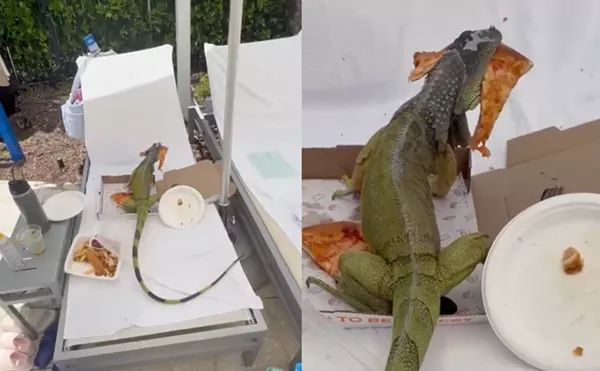This week, scientists in Spain announced they had identified and isolated the gene in yeast that causes beer to foam. A blog about the discovery ran on NPR's food blog, The Salt, extolling the virtues of more resilient, longer -asting foam.
Confused? So were the commenters on NPR's Facebook page who universally booed the idea. Who wants more foam on their beer in the first place? Isn't too much foam a bad thing? A sign that the beer was poured too quickly? That the keg was over pressurized?
And, umm... Hello? Genetically-modifying our beer now? Take the soy, but not our beer!
To clear up the foamy confusion - and to stop scaring myself with mutant yeast GMO nightmares - I contacted local brewmaster Matthew Cox of Big Bear Brewing Co. in Coral Springs.
Cox has been a brewmaster for over 15 years and has been at Big Bear for 12. This is a man who knows what goes into making a great beer.
He says that in actuality, the right amount of foam is a good thing.
"On the consumer side, when you hear about foam on beer, it's normally looked at in a negative way. But, think about it -- if you were served a beer without foam, you would think the beer was flat. There's a bunch of flavors and aromas trapped in there and it also smooths out the carbonation of the beer so it doesn't burn your tongue. So the right amount of foam that sticks around is a sign of good brewing process. "
Cox explains that different beers have different textures of foam, with the heaviest beers such as stouts having a thick, almost mousse-like foam. In general, you want to see about two inches of foam that sticks around for a while. This is a sign that the beer has been brewed with the right ingredients, stored at the proper temperature, and poured correctly. But, in that case, isn't it kind of cheating to genetically modify the yeast for better foam?
"Yes, but there's all kinds of cross-breeding that always happens. There's not just one kind of barley in the world, and you cross them until you finally get what you want. I'm not much for the GMO thing etiher, but there's blending and cross-breeding methods that lead to a better brewing process. So you want experimentation. It's actually a good thing."
Cox says that the kind of gene-modifying the scientists in Spain are working on is a far cry from making corn crops that can't be killed by herbicides. It's a lot more like traditional crass-breeding. And anyway, most of the bigger breweries have been playing chemistry with your beer for years.
"You look at any mass-produced beer and they're going to have a thinner foam that's not going to last quite as long, but then there are very light beers like German pilsners that, for a really light beer, will have a really thick dense foam on top. And that, of course, also varies for beers that are poured through nitrogen methods like Guinness."
So to make up for that inferior foam - which apparently we Americans really do like, no matter what we say - most of the mass breweries use foam enhancers. This must be where the soap rumor came from. I remember learning from a college chem professor that American beers all have soap added to them because by law they have to be pasteurized, and that kills the foam.
This is not true, according to Cox. Only bottled and canned beer is pasteurized, not draft, and he cited the foam enhancers again. Good to know there's no Tide in my beer.
So there you have it. Foam is good, GMO yeast is nothing to be afraid of, and there is no soap in American beer. While I had him on the phone, I also asked him to clear up the skunk myth. Contrary to popular belief, letting canned or bottled beer that has been chilled get warm does not "skunk" it. You've been throwing out those leftover beers at the bottom of the warm cooler for no reason! Sunlight, however, will skunk a beer, sometimes in as little as 30 seconds.










